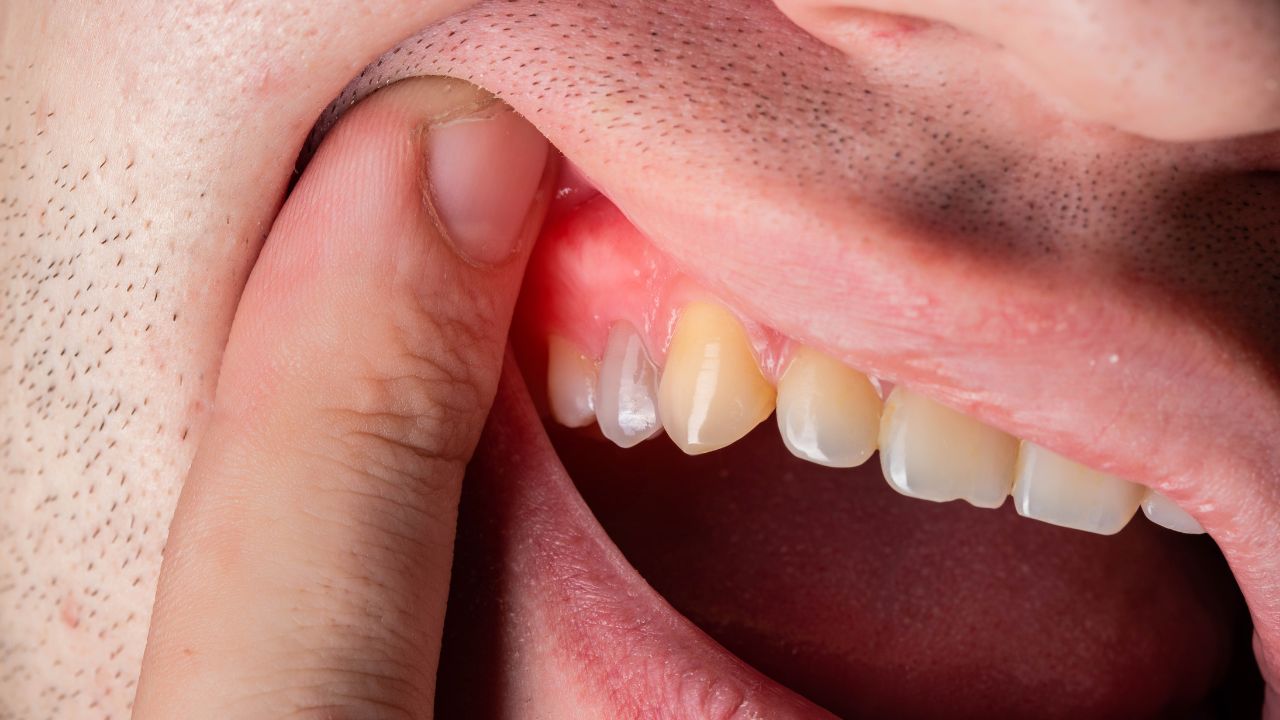Gum Pimple (Gum Boil) Treatment Options

Have you ever noticed a small pimple-like bump on your gum that seems to come out of nowhere? These little bumps, known as gum pimples or gum boils, can be quite concerning and uncomfortable.
In this blog post, we will dive into the world of gum pimples, exploring what they are, their causes, symptoms, and available treatment options.
What’s Popping? Understanding Gum Pimples (Gum Boils)
A gum pimple, or gum boil, is a small, pus-filled bump that forms on the gums. The bumps can appear anywhere on the gums and are usually painful and tender to the touch.
Gum boils are caused by a buildup of pus in the gums, often due to a bacterial infection or inflammation. There are a few different types of gum boils, let’s review them.
Types of Gum Boils
There are two main types of gum boil or abscesses: periodontal abscesses and periapical abscesses. Here’s a brief explanation of each type:
Periodontal Abscess: It occurs in the gum tissue and is typically caused by an infection that affects the gums and bone. It often develops due to advanced gum disease (periodontitis) or trapped food particles or debris that lead to bacterial growth.
Periodontal abscesses may cause localized swelling, pain, redness, and a discharge of pus from the affected area. If left untreated, the infection can spread and lead to further complications.
Periapical Abscess: It originates from the tooth’s pulp and is commonly associated with a dental cavity or tooth decay. When a tooth becomes infected, the bacteria can spread from the pulp chamber at the tooth’s center to the surrounding tissues, including the gum area.
Periapical abscesses are characterized by localized swelling, tenderness, throbbing pain, and the formation of a pus-filled bump near the affected tooth. If the infection is not addressed promptly, it can cause significant discomfort and potentially damage the tooth and surrounding structures.
The Root of the Problem: Causes of Gum Abscess
Various factors, including poor oral hygiene, gum disease, tooth decay, trauma, and stress, can cause gum boils. When bacteria invade the gum tissue, it can lead to inflammation and infection, causing the gum line to swell and fill with pus. This buildup of pus can cause pressure and pain, leading to the formation of a gum boil.
Red Flags: Recognizing the Symptoms of Gum Boils
A tooth abscess can be identified through the following signs and symptoms:
- Severe throbbing toothache in the affected area
- The pain can spread to the jawbone, ear, or neck
- Pain or discomfort with hot and cold temperatures
- Discomfort or pain when chewing or biting
- Swollen lymph nodes under the jaw or in the neck
- Fever
- Bad breath or foul odor in the mouth
- Rush of salty fluid in the mouth due to the rupture of the abscess
How Gum Boils Are Diagnosed
An X-ray of the affected tooth can aid in the identification of an abscess. Additionally, your dentist may use X-rays to examine the extent of the infection, determining if it has spread to other areas and caused abscesses.
A CT scan may be recommended in cases where the infection has spread to other parts of the neck. This imaging technique can provide a more comprehensive view of the extent and severity of the infection.
Gum Abscess Treatment Options
Treatment options for gum boils can vary depending on the severity of the infection and the underlying cause. However, some common treatment options include:
- Drainage: If the gum boil is small and not causing significant pain or discomfort, your dentist may drain the pus from the bump to relieve pressure and promote healing.
- Antibiotics: If the infection is more severe, your dentist may prescribe antibiotics to help fight the bacteria and reduce inflammation. This can be done in combination with drainage or other treatments.
- Root Canal Therapy: In some cases, the infection may have spread to the tooth root, causing a root canal infection. Your dentist may recommend root canal therapy to remove the infected tissue and save the tooth.
- Tooth Extraction: If the infection is severe and has caused significant damage to the tooth or surrounding tissue, your dentist may recommend removing the tooth to prevent further complications.
Drilling Down: The Role of Root Canal Therapy in Treating Gum Boils
To treat a gum boil with root canal therapy, the dentist will administer a local anesthetic to numb the area around the tooth. They will then create a small hole in the top of the tooth to access the infected pulp chamber and remove any infected tissue using specialized tools. Once the chamber is cleaned and disinfected, the dentist will fill the chamber with a material called gutta-percha, which seals the tooth and prevents bacteria from re-entering.
After the root canal procedure, the dentist may place a temporary filling to protect the tooth while it heals. Once the tooth has had time to recover fully, a permanent filling or crown may be placed to provide additional protection and restore the tooth’s function and appearance.
Pulling the Problem: When Tooth Extraction is Necessary
Tooth extraction may be necessary in cases where the tooth is severely infected or damaged and other treatment options are no longer effective or viable.
In the case of a gum boil, a root canal procedure may be recommended to remove the infected pulp and seal the tooth, which can often save the tooth and prevent further infection. However, extraction may be the only option if the infection has spread to the surrounding bone or soft tissue or if the tooth is too damaged to be saved.
Other reasons for tooth extraction include severe tooth decay, advanced gum disease, crowding of teeth, or impacted wisdom teeth. In some cases, orthodontic treatment may also require tooth extraction to create space in the mouth for the remaining teeth to align properly.
Extraction may also be necessary if the patient has a weakened immune system, as infected teeth can pose a risk of systemic infection and may need to be removed to prevent further issues.
Prescription for Success: Antibiotics for Bacterial Infection
Antibiotics can be an effective treatment option for gum boils caused by bacterial infection. Your dentist may prescribe antibiotics to help fight the disease and reduce inflammation. However, taking the full course of antibiotics is essential to ensure the infection is fully cleared.
Complications of Untreated Gum Boils
If left untreated, gum boils can lead to many complications, including tooth loss, bone loss, and even sepsis, a potentially life-threatening condition. Therefore, it is essential to seek prompt medical attention if you experience any symptoms of a gum boil to prevent these complications.
Dental Care Best Practices to Prevent Gum Boils
- Regular dental checkups can help catch oral health problems early before they become more serious. Your dentist can also advise maintaining good oral hygiene and preventing gum boils.
- Following home remedies like rinsing your mouth with warm salt water.
- Use over-the-counter pain medications, such as acetaminophen (Tylenol and others) or ibuprofen (Advil, Motrin IB, and others), as required.
Dentist In Harrisburg, NC Gum Boil Treatment
If you suspect that you have a gum boil or are experiencing any of the symptoms associated with this condition, it is crucial to seek professional help as soon as possible. Our dentist in Harrisburg, NC, can provide an accurate diagnosis and offer treatment options to help alleviate your discomfort.
Prevention is key when it comes to gum boils. Maintaining good oral hygiene practices, such as brushing regularly, flossing regularly, and visiting your dentist for regular check-ups and deep cleanings, can help to prevent gum boils from forming in the first place.
If you do develop a gum boil, don’t ignore it. Early intervention can help to prevent the infection from spreading and causing further damage to your oral health. In severe cases, untreated gum boils can lead to serious health complications.
If you have any questions or concerns about gum boils or your oral health in general, don’t hesitate to reach out to our dentist in Harrisburg, NC. Our team is here to provide you with the information and support you need to maintain healthy teeth and gums for life.
Our Harrisburg NC Dentist Office
To learn more about dental treatments from Icard & Strein Family Dentistry, or to schedule an appointment, call our Harrisburg, NC dental office today at 704.455.5003.



